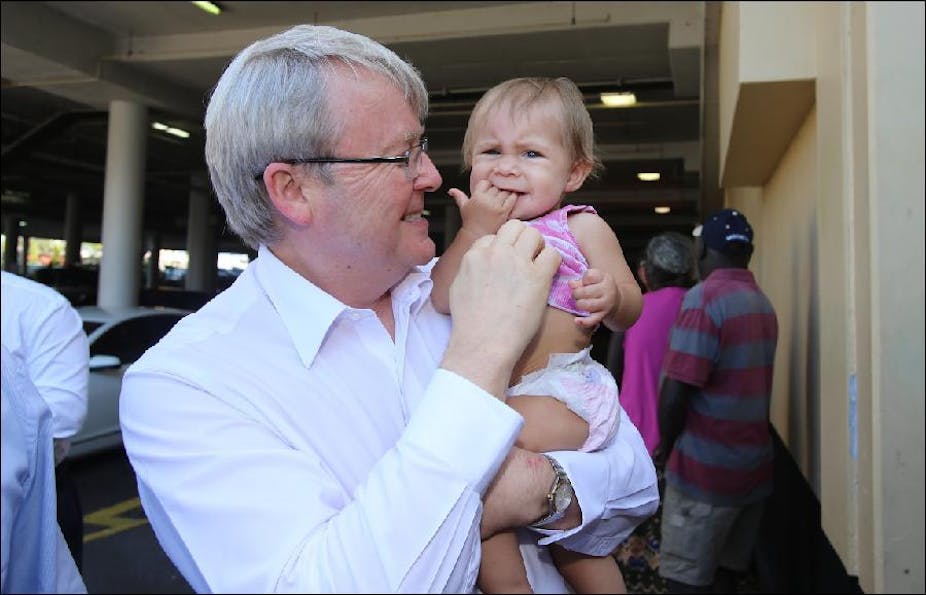On Monday, prime minister Kevin Rudd announced a series of proposals to change the way the Australian Labor Party selects its parliamentary leader.
Under his proposal, incumbents can only be challenged by MPs if three-quarters of the party caucus agree (leaders are expected to resign following an electoral loss). In ballots for the leadership, he proposes that ALP members will be able to vote for the leadership with equal weight to that of MPs.
The interpretation of this proposal has largely been reported in two ways.
The majority of coverage has been through the lens of the Rudd-Julia Gillard leadership contest. This is unsurprising, as this personalised power struggle has dominated political reportage for over three years. Certainly this proposal – if adopted, as appears likely – would close off the type of situation that occurred in 2010, where Rudd was removed by a simple majority of MPs (led by the ever-present “faceless men” of the ALP’s factions) irrespective of the weight he retained in the popular imagination.
Had Labor had this system in 2010 Rudd would have retained the leadership, or the conspirators would have had to be more public recruiting for the spill and selling their cause to rank-and-file party members.
Another focus of discussion is on the practicalities of this change. Leadership challenges in the past tend to be comparatively quick affairs, brewing up over a week or so, and leading to a vote at the first available window of opportunity when MPs are gathered together. Leadership contests also tend to create uncertainty in the community and skittishness in the economy.
With this new system, considerable planning and campaigning will need to occur in the event of a spill vote if the rank-and-file members are to be included. In these situations, there will be longer periods of uncertainty where the National Executive or opposition leadership team is in disarray.
While these possible problems are real, it is important to see this as more than the fallout of the ALP’s leadership squabbles. The decision to explicitly recognise an expanded role for party members clearly acknowledges a widening gap between Australia’s professional parties and the wider public.
Over a number of decades, the shift of parties as “mass” (up to 10% of the electorate) institutions to professional parties that focus on the use of centralised campaign techniques and marketing has distanced parties from the electorate. As parties move away from ideological positions and focus on servicing particular market needs, they’ve redefined their relationships with citizens.
The tipping point of this change is often associated with the advertising-focused and leader-oriented “It’s Time” campaign of Gough Whitlam. While it was an effective campaign in terms of its reach and longevity, it cemented the tendency towards centralised campaigns focused on mass media targeting swinging voters.
With the increase in marketing-oriented political campaigns, parties have tended to become more volatile in their ideological positioning and tended not to think about voters as people with whom they have a relationship, as much as economic actors with which they engage in periodic transactions.
To this end, in recent years the ALP and the National Party have been experimenting with US style open “primary” contests: electorate-level contests to select candidates which include both party members and general members of the public. A good example of this is the Nationals primary in the electorate of New England, won by current senator Barnaby Joyce.
To date, the democratic character of these primaries varies in terms of the percentage weighting given to party members and citizens over party functionaries. Their use in marginal and opposition-held electorates has also undermined the claim of a pure democratic motive over more pragmatic attempts to grab seats through more intensive campaigning in important electorates.
Democratic structures and procedures within organisations may be easy to change for a leader like Rudd, who has managed to hold his party hostage to his own personal position. But at a basic democratic level, the proposal presents some problems.
Rudd suggests it will end the type of leadership dysfunction we’ve seen for several years, but this is a questionable claim. This system could result in the retention of extremely unpopular leader who has a core group of committed supporters, and the very undemocratic possibility of being the leader with only 25.1% support in caucus.
It could result in a leader being subject to rolling spills where they face the overwhelming disapproval of MPs and member support.
Finally, because there is no “recall” option of rank-and-file members, member participation is highly contingent on the politics of the “faceless men” of the parliamentary wing. Like with the limited experiments with open primaries, access to the ballot remains controlled by the inner circle.

